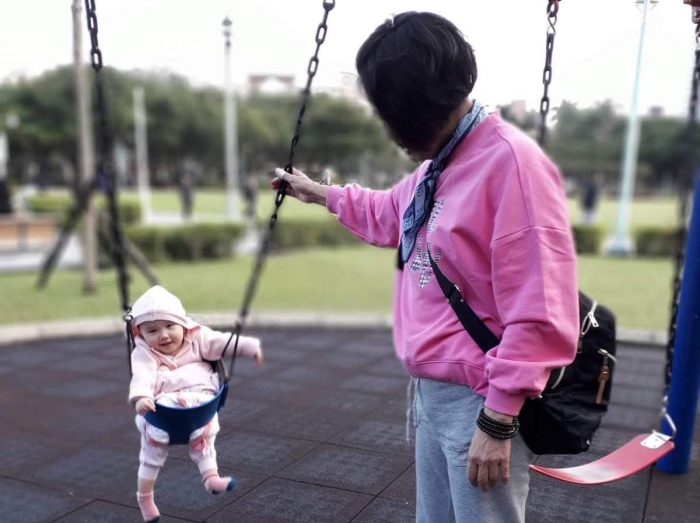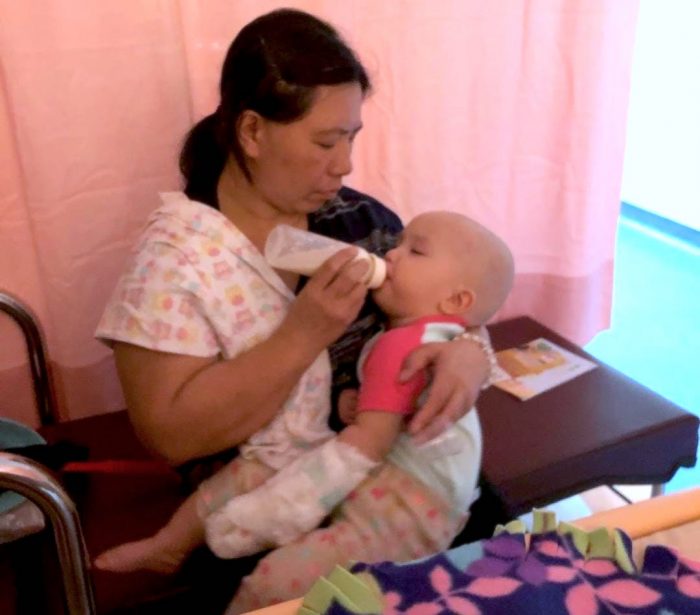A Support Network Helps Us Better Care for Our AADC-deficient Daughter
Written by |

My wife and I would not have accomplished as much as we have without our support network. These people have played a critical role in helping us manage our daughter Rylae-Ann’s aromatic l-amino acid decarboxylase (AADC) deficiency.
I used to want to take the world on by myself. I would have been more successful if I had relied on those who were ready to lend a helping hand, but a couple of things held me back.
Firstly, I thought I’d be bothering others with my problems. I couldn’t have been more wrong, because others genuinely wanted to help. I had only imagined that they would view it as a burden.
Secondly, I worried if others would be able to care for my daughter. Again, this was an invented problem. With a little bit of guidance, my family and friends are more than capable of watching her. Even just a few hours allows my wife and I to go on a date, or take a well-deserved nap.
Our support network eventually materialized, but we would have been better off establishing it sooner and more purposefully. After enlisting the help of others, I found I had more energy and less stress when it came to helping my daughter because I was sharing the load. I became a more effective father and husband.
Following are several ways we’ve built up a reliable support network to help us care for our AADC-deficient daughter.
Develop a schedule
First things first: develop your family’s schedule. List the times you need for your responsibilities, such as work or errands, then overlay that with your child’s sleep schedule. We’ve found that the best time to have others help is when our daughter is sleeping. This puts us more at ease, but it’s also easier for those watching her. Additionally, my wife and I ensure we’re with Rylae-Ann on days we know she’ll have an oculogyric crisis.
Assign the remaining hours to adults living in the household. We keep it flexible and never treat it like a job. The key is distributing the load, so one family member has downtime. My wife and I trade midnight duties to get better sleep every other day.
Family
Although requesting help wasn’t easy for us, talking with family members was an easy first step. My wife and I also struggled with separation from our daughter. We worried while we were away, and finding help seemed like more work. Gradually, we’ve become more comfortable with leaving our daughter and her unique needs under the supervision of others.

Rylae-Ann spends the afternoon with family while Mom and Dad take a well-deserved break. (Courtesy of Richard E. Poulin III)
Friends
Learning to ask for help from family made it easier to reach out to friends. We live far from most of our family, so reaching out to close friends was the next best option. As we learned more about the special needs communities and rare diseases networks, we began to meet other great families in similar situations.
Like with carpooling, where people take turns driving each other to school or work, the community can rotate child care. Create a schedule with other parents where you watch the children for an evening or a day on the weekend, then switch roles the following week. Other families facing similar challenges will relate to your plight and also benefit from the shared schedule.
Hired help
My wife and I work full time Monday through Friday, and also have part-time jobs. We knew we needed someone daily, and we couldn’t ask a family or friend to take that on as a volunteer. By hiring someone, I felt more comfortable assigning duties and providing feedback.
We sought out nannies on our own, and this was a huge undertaking. Consider contacting approved nanny agencies to aid in the hiring, because it’s important for the nanny to have references that verify their ability. You do not want to be in the position of hiring and firing until you find the right person. But if someone isn’t a good fit for your family, don’t be shy about letting them go.
The cost of hiring a nanny can vary. Some friends have hired stay-at-home moms, grandparents, or retirees, as they tend to be more affordable.
Ultimately, we found a nanny to live with us. We took our time selecting the right person. We looked for someone caring, responsible, and patient who had experience as a nanny. Finding someone with experience caring for an AADC child was impossible, because the condition is so rare. However, we came across many great candidates who had taken care of other special needs children and the elderly. We had an excellent pool to select from, and were extremely fortunate to have our nanny join our family.

Rylae-Ann’s nanny takes loving care of her while we are away. (Courtesy of Richard E. Poulin III)
Asking for help keeps you strong
By sharing duties, your child will have better care. Each person in your support network will provide exceptional care without anyone becoming too taxed. This means your child receives higher quality attention. Even if you only take a few hours of downtime, it will result in improved progress for your child and better health for you.
***
Note: AADC News is strictly a news and information website about the disease. It does not provide medical advice, diagnosis, or treatment. This content is not intended to be a substitute for professional medical advice, diagnosis, or treatment. Always seek the advice of your physician or other qualified health provider with any questions you may have regarding a medical condition. Never disregard professional medical advice or delay in seeking it because of something you have read on this website. The opinions expressed in this column are not those of AADC News or its parent company, Bionews, and are intended to spark discussion about issues pertaining to aromatic l-amino acid decarboxylase deficiency.






Leave a comment
Fill in the required fields to post. Your email address will not be published.